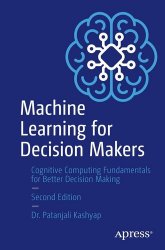Machine Learning for Decision Makers: Cognitive Computing Fundamentals for Better Decision Making 2nd Edition
- Добавил: literator
- Дата: 22-12-2023, 18:52
- Комментариев: 0
 Название: Machine Learning for Decision Makers: Cognitive Computing Fundamentals for Better Decision Making 2nd Edition
Название: Machine Learning for Decision Makers: Cognitive Computing Fundamentals for Better Decision Making 2nd EditionАвтор: Patanjali Kashyap
Издательство: Apress
Год: 2024
Страниц: 676
Язык: английский
Формат: pdf
Размер: 10.1 MB
This new and updated edition takes you through the details of Machine Learning to give you an understanding of cognitive computing, IoT, Big Data, AI, quantum computing, and more. The book explains how Machine Learning techniques are used to solve fundamental and complex societal and industry problems.This second edition builds upon the foundation of the first book, revises all of the chapters, and updates the research, case studies, and practical examples to bring the book up to date with changes that have occurred in Machine Learning. A new chapter on quantum computers and Machine Learning is included to prepare you for future challenges. Insights for decision makers will help you understand Machine Learning and associated technologies and make efficient, reliable, smart, and efficient business decisions. All aspects of Machine Learning are covered, ranging from algorithms to industry applications. Wherever possible, required practical guidelines and best practices related to Machine Learning and associated technologies are discussed. Also covered in this edition are hot-button topics such as ChatGPT, superposition, Quantum Machine Learning, and reinforcement learning from human feedback (RLHF) technology. Upon completing this book, you will understand Machine Learning, IoT, and cognitive computing and be prepared to cope with future challenges related to Machine Learning.
Programming Languages for Machine Learning:
Selecting a programming language to program “critical tasks” is a difficult and intelligent decision. It depends on multiple factors, based on the requirements and relevance of a particular business scenario. It becomes more challenging when it is associated with Machine Learning and cognitive computing, because the process of programming involves embedding intelligence into the raw program and a lot of data manipulation and crunching capabilities. However, the factors described in the following list help make these decisions, as they provide insights and guidelines for choosing the appropriate language. Parameters like speed, programmability, library support, built-in functionality of the language, open-source support, and scalability are discussed in brief.
R is a free software development environment for statistical computing, graphics, data mining, and machine learning-based computing. It compiles and runs on a wide variety of available platforms, including UNIX, Linux, Windows, and macOS. R is one of the most popular software packages and programming languages. It is popular among statisticians and researchers because it provides excellent and elegant statistical coding/programming features.
The Scala programming language is a combination of a functional and an object-oriented programming language. It runs on the Java Virtual Machine (JVM). Its .NET version is also available, which empowers it to run on the .NET environment as well. Scala is based on the idea that there are a lot of commonalities between functional and object-oriented programming languages. As a functional programming language, Scala provides pattern matching capabilities (which are useful for Machine Learning bound programming). Whereas as an object-oriented programming language, it adopts the object-orientation like facilities of using classes and polymorphism. Scala inherited a lot of features from Java, along with many features that are not in Java.
Python is an interpreted and interactive object-oriented, high-level programming language. It is called a strong general-purpose programming language. Python places strong emphasis on code reliability and simplicity so that programmers can develop applications rapidly. It is a multi-paradigm programming language, which allows users to code in several different programming styles. Python is useful for scientific and Machine Learning related tasks. It has special libraries for Machine Learning and image processing.
The process of training a Machine Learning model includes providing an ML algorithm (that is, the learning algorithm) with training data. The training data is supposed to contain the correct answer. This is commonly known as the target attribute or for short, the target. The Machine Learning algorithm finds the patterns in the available training data set. After that, it maps it to input data attributes to the target (the answer or result that you want to predict), and it outputs an ML model that gathers these patterns.
What You Will Learn:
Master the essentials of Machine Learning, AI, cloud, and the cognitive computing technology stack
Understand business and enterprise decision-making using Machine Learning
Become familiar with Machine Learning best practices
Gain knowledge of quantum computing and Quantum Machine Learning
Who This Book Is For:
Managers tasked with making key decisions who want to learn how and when Machine Learning and related technologies can help them.
Скачать Machine Learning for Decision Makers: Cognitive Computing Fundamentals for Better Decision Making 2nd Edition
Внимание
Уважаемый посетитель, Вы зашли на сайт как незарегистрированный пользователь.
Мы рекомендуем Вам зарегистрироваться либо войти на сайт под своим именем.
Уважаемый посетитель, Вы зашли на сайт как незарегистрированный пользователь.
Мы рекомендуем Вам зарегистрироваться либо войти на сайт под своим именем.
Информация
Посетители, находящиеся в группе Гости, не могут оставлять комментарии к данной публикации.
Посетители, находящиеся в группе Гости, не могут оставлять комментарии к данной публикации.
